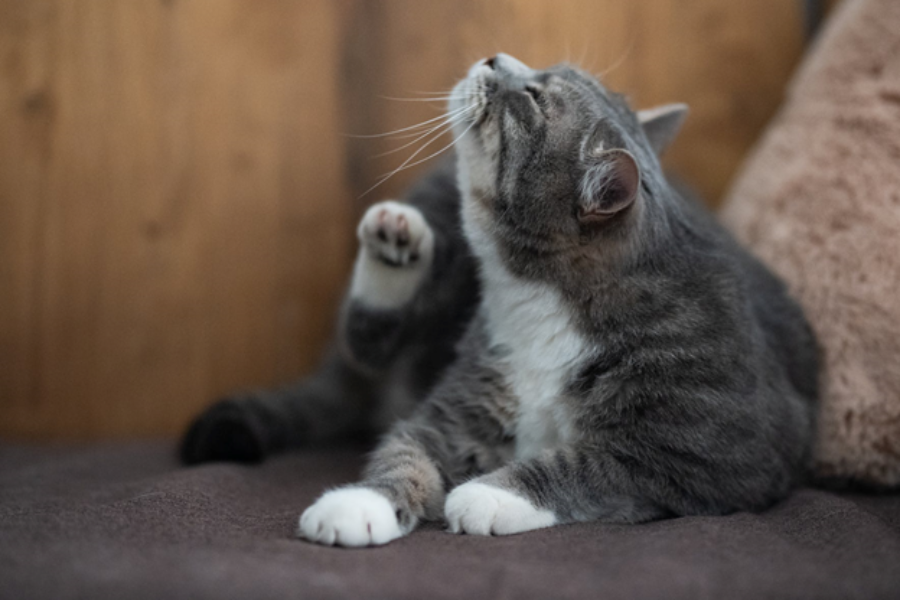Cats are one of the cleanest animals around; they can keep themselves clean with minimal help from humans. Their reputation for staying clean and keeping the area where they live clean as well is one of the major reasons why cats are such a preference among many pet owners.
If you own a cat, you might notice that they are constantly licking themselves. Their saliva naturally contains a chemical that helps them fight off germs and bacteria and removes any dirt or foreign objects from their fur. Leave your cat alone, and it will groom itself to perfection most of the time.
Their mechanism to clean themselves is so strong that most vets don’t even recommend regular, frequent bathing unless your cat’s fur is obviously becoming very dirty.
Cats are known for being very disciplined in toilet manners, too; they don’t just go anywhere, and they make sure that the place is clean before they even do their business.
Imagine then, with that level of cleanliness, how a flea infestation must bother them!
What Are Fleas?
Fleas are tiny parasites that feed off warm-blooded hosts’ blood. They can live on cats, dogs, and humans too. All cats are at some level vulnerable to flea infestations. While it may be super easy to get infested with fleas, it can be a real pain to get rid of them.
You can often see the fleas on your cat’s body with your naked eye, but if your cat is furry, they might be hard to notice and catch until the problem has gotten out of hand. Fleas usually live on a cat’s head, neck and back, because those areas are hard for the cat to reach with its paws – any other place and the cat will grab them with her claws and kill. Sometimes, in frustration, your cat might even scratch itself badly while attempting to get the fleas out of her fur with her sharp, pointy claws.
While fleas might sound like a nuisance at best, severe enough flea infestations that do not get treated effectively can prove to be fatal for your cat, so please don’t take your cat’s flea problem lightly.
While fleas cause considerable discomfort and annoyance to your cat by constantly making her itch, they also do a lot more than that. Fleas suck the blood out of your cat’s body, and a large, serious infestation can cause enough blood loss for your cat to suffer from anemia, which can be deadly. If your cat contracts anemia from the flea bites, it is going to require blood transfusions and supplements, which are costly treatments and can still not guarantee the survival of your cat.
How Do Cats Get Infested?
The most common way for a cat to become a carrier of fleas is by coming into contact with a cat or another animal that already has a flea problem. Furry animals are flea favorites; they easily transfer from one furry body to the next and can hide very well in all that hair.
Your cat can even become infested if a flea egg latches onto their fur. Fleas multiply and lay eggs very quickly, so a single flea can aggravate the problem by laying up to 50 eggs a day and becoming a downright torment for your cat and yourself. Their eggs can also fall onto carpets and sofas and transfer themselves to other cats and dogs in the house.
If you don’t treat the problem right away, it becomes extremely hard to control it, and you need a vet’s help if you let it get that far.
Ways to Fight Flea Infestations
There are several remedies for flea infestations, depending on how severe the infestation is at that stage. For a small infestation, there are even home remedies available that are pretty effective, but if the problem is beyond your cat, you might need medication and a vet’s assistance to make your cat flea-free again.
A quick tip for cat owners; regular brushing of your cat’s fur is an easy and sure-fire way of catching a flea problem in its initial stages and nipping it in the bud, saving you all the trouble and the costs later.
So let’s get to it. Possible remedies include:
An Apple Cider Solution
Diluted apple cider vinegar is a strong contender for fighting not-so-severe cases of flea infestations. Put one part apple cider vinegar with three parts water and store it in a spray bottle. Spray your cat with the solution on her affected areas. She might squirm as cats do not like the smell of vinegar, but hold her tight and make sure the solution goes through her fur. Your cat will be flea-free in 3-5 days. Note that this will only work in the initial stages of the infestation.
Flea Combs
If your cat is not riddled with a lot of fleas, you might be able to pick out some using a flea comb. Run the narrow-toothed flea comb through her fur and kill the fleas by drowning them in hot water. If there were only a few fleas, you can get them all in a few combing sessions.
Flea Shampoos and Baths
Since fleas are such a common problem in cats, many brands have formulated special flea shampoos for cats. Simple give your cat a bath, scrubbing her well with the flea shampoo, and hopefully, all the fleas living off of her will be killed.
Flea Sprays
For severe infestations, where nothing else proves effective, there are strong flea sprays available that can chemically eradicate the fleas that are bothering your cat. Take care not to spray your cat near her nose, ears, or genitalia. It is best if you take a vet’s advice before purchasing and using a flea spray.
If your cat has developed a flea infestation and you want to discuss it with a vet, book an appointment with our expert vet by calling us at 678-714-5477.


